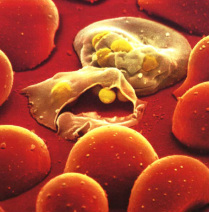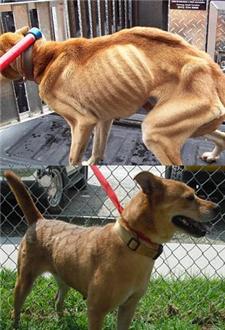Feeding Skinny Animals: Helpful or Harmful?

By Laura Nelson, Dane County Humane Society Extern
What is refeeding syndrome?
Refeeding syndrome is an uncommon problem seen in general practice, but becomes much more of a reality in the shelter environment. It occurs when a starving animal becomes fed too generously, often out of sympathy for the animal's condition (abuse, neglect, or abandonment). While a good-hearted act, it can prove disastrous for the animal, as consequential metabolic alterations occur as a result.
When are animals affected?
What happens during starvation?
Starvation causes carbohydrate, fat, and protein stores to become depleted. Skeletal muscle becomes utilized for energy, and muscle wasting occurs as a result. The body begins to produce ketones (acids produced by the body that can be fatal in high amounts), insulin secretion decreases, and a decrease in metabolic rate occurs. Starvation also causes potassium, magnesium, and phosphorus electrolytes to become depleted. This can be very important because these electrolytes are necessary for vital body functions.
What happens during refeeding syndrome?
When animals are fed after a period of starvation, the body is able to again utilize glucose for energy, which it wasn’t able to do during starvation because glucose was depleted. Glucose needs phosphorus to generate energy for the body, so it continues to draw from the already decreased amount, making the levels of phosphorus even lower. This decrease in phosphorus level leads to the most severe effects of refeeding syndrome.
What is refeeding syndrome?
Refeeding syndrome is an uncommon problem seen in general practice, but becomes much more of a reality in the shelter environment. It occurs when a starving animal becomes fed too generously, often out of sympathy for the animal's condition (abuse, neglect, or abandonment). While a good-hearted act, it can prove disastrous for the animal, as consequential metabolic alterations occur as a result.
When are animals affected?
- When they have a body condition score less than 3.5/9.
- When they have fasted for more than 5-10 days even if they are of normal body condition.
- Animals who have lost more than 10% body weight in less than two months.
- Animals with hepatic lipidosis (fatty liver), diabetic ketoacidosis, or Cushing's disease (hyperadrenocorticism).
- Animals that are lactating, growing, or are in gestation are more susceptible.
- Cats may be more susceptible than dogs due to decreased energy stores.
What happens during starvation?
Starvation causes carbohydrate, fat, and protein stores to become depleted. Skeletal muscle becomes utilized for energy, and muscle wasting occurs as a result. The body begins to produce ketones (acids produced by the body that can be fatal in high amounts), insulin secretion decreases, and a decrease in metabolic rate occurs. Starvation also causes potassium, magnesium, and phosphorus electrolytes to become depleted. This can be very important because these electrolytes are necessary for vital body functions.
What happens during refeeding syndrome?
When animals are fed after a period of starvation, the body is able to again utilize glucose for energy, which it wasn’t able to do during starvation because glucose was depleted. Glucose needs phosphorus to generate energy for the body, so it continues to draw from the already decreased amount, making the levels of phosphorus even lower. This decrease in phosphorus level leads to the most severe effects of refeeding syndrome.
|
What are the effects of low phosphorus levels?
The main effect of decreased phosphorus is hemolytic anemia. Phosphorus is needed for red blood cells in the body to maintain their shape, so lack of phosphorus causes disrupts the integrity of the red blood cells and causes them to burst. Because red blood cells are responsible for delivering oxygen to tissues in the body, loss of red blood cells causes lack of oxygen delivery. This can lead to weakness, lethargy, neurological symptoms, and death. What can happen from decreased potassium, magnesium, and glucose? Muscle weakness, neurological abnormalities (seizures, weakness, coma), and cardiac abnormalities. Low magnesium can also lead to irritability or aggression. What are the clinical signs of refeeding syndrome?
|
|
How do you treat refeeding syndrome?
|
References
For more information, please consult the following references and resources:
For more information, please consult the following references and resources:
- Starvation and Refeeding Animals Information Sheet. Accessed on www.sheltermedicine.com.
- Hypophosphatemia and Refeeding Syndrome. Lippo DVM, Nathan and Byers DVM, Christopher G. Standards of Care: Emergency and Critical Care Medicine (2008) 10.4, 6-10.



